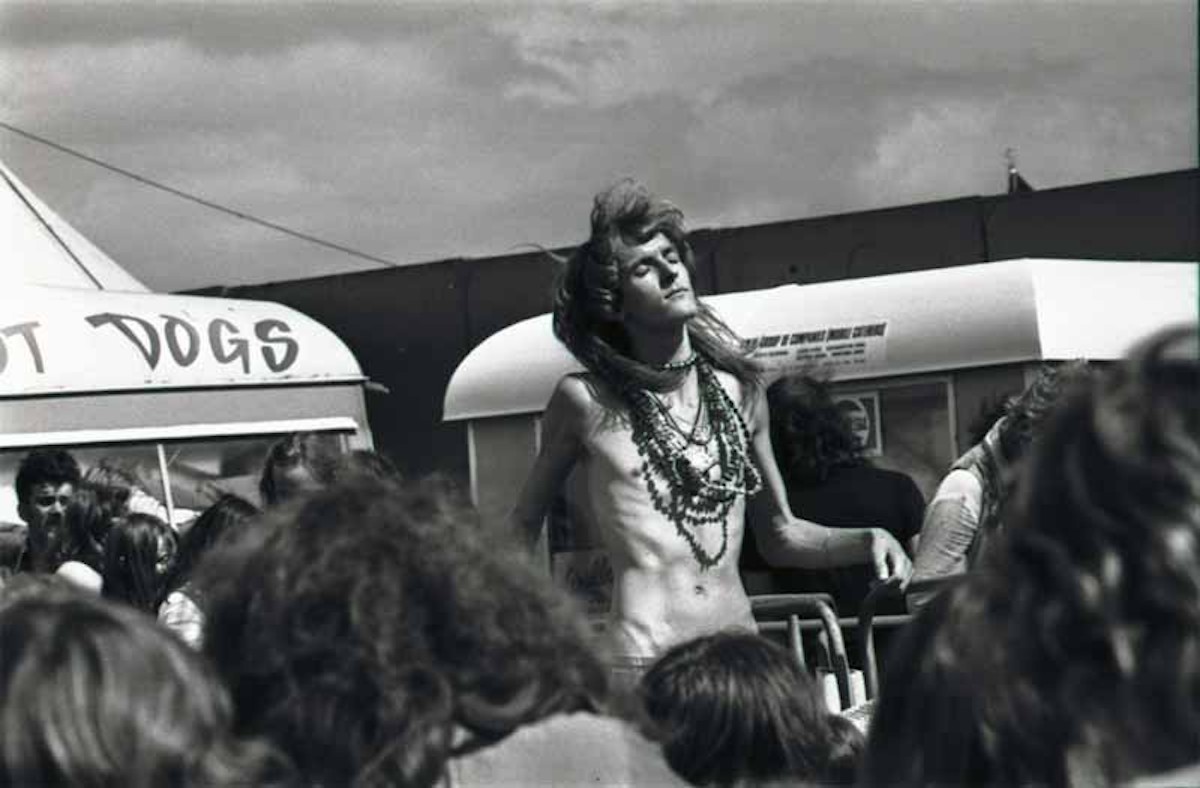
Jellett at the Reading Festival, 1974 (Source- Vin Miles, UK Rock Festivals)
It was a Saturday evening, St Valentine’s Day 1970, when William Jellett first thought he might be Jesus. He was on the London Underground, travelling back from work, and noticed the headline of the newspaper unfurled opposite him: “Cambridge riots — two policemen beaten up”. There had been student protests the night before, on Friday the 13th.
Feeling “hurt for my brothers,” he later told 19 magazine, he put his head in his hands. He had the sense that everyone was his brother or sister, and that the music and freedom he had found over the last few years were slipping away, with this rising violence. The lights flickered between stations, catching the dull livery.
He was only 21, but violence had always bothered him; back in the children’s home, back at school, back with the mods and rockers on the beaches. It seemed to be all around him now. The music press talked about Manson and Altamont and Kent State, and sometimes there were photographs of crowds at gigs too, in which he could see himself dancing, conspicuously. Music was getting heavier too, at the gigs he went to nearly every night: Black Sabbath had released their first album the day before, The Who recorded “Live at Leeds” that night.
As the train rumbled forward, Jellett looked into his hands. They were less smooth than they had been, he saw. He had not been able to hold down regular work for a while, leaving the job he had found when he first moved to London, at the tea importer, then the job in the storeroom at the BBC, where he had spent much of his time scrawling designs in biro on cardboard. He now sometimes told people he “worked in an office”, if they asked, between songs, or in queues. He did, really. Travelling around the city, he cleaned flats and houses, and offices. His hands were hardening with the work. He had never noticed the lines in his palms before.
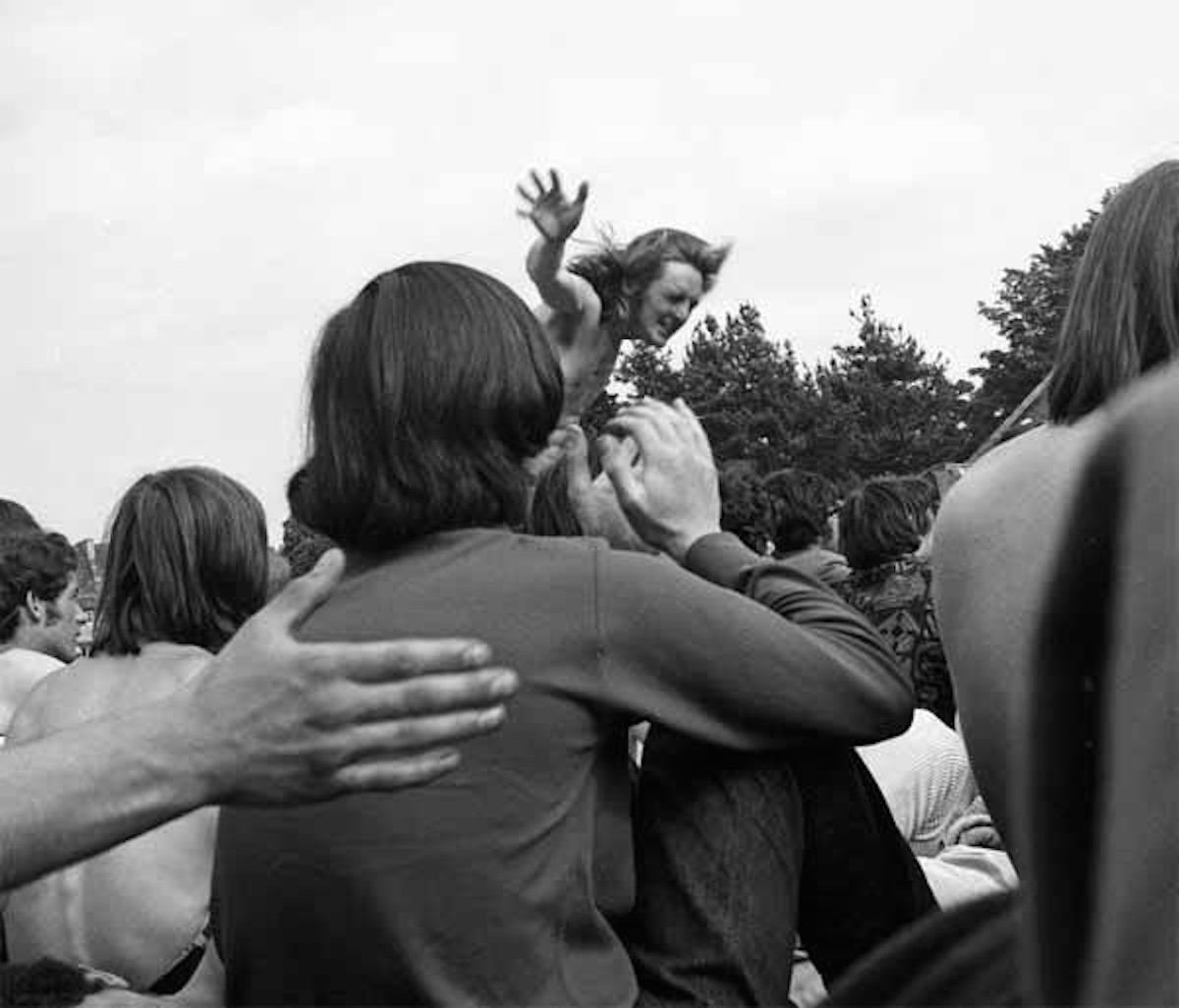
Jellett at Bath Blues Festival, 1969 (Source- Lawrence Impey, UK Rock Festivals)
For the first time, Jellett saw that the lines crossed in the centre of each hand. The cross, he would say, in the “idle of my palm”. He was well-attuned to religious symbolism, and divine calling. His parents had been in the Salvation Army, and he had felt something of this significance over the last couple of years, in the music he listened to.
Now, the logic overcame him. He thought about reincarnation, and about universality and interconnectedness. If we are all one, he thought, he could be anyone. People had been calling him “Jesus” for a while, and he had adopted the nickname, but now it made sense. If he had been reincarnated, he thought, “there would be no permissive society, no underground, just people wanting to be themselves and live their lives the way they wanted to before”.
The crosses were stigmata, he thought.
It is likely no other fan ever saw more gigs than Jellett. For more than a quarter of a century — the late sixties to the early nineties, perhaps even longer — he was one of the most visible music fans in Britain. He was always there, it seemed, at mod shows and hippie shows, at soul shows and rock shows and reggae shows, at punk shows and folk shows, and indie shows and shows by bands with new electronic instruments. He was at festivals and fashionable hangouts, at events that linger in the history books, and gigs by teenage bands at out of the way venues. Magazines profiled him, and he was sought out by photographers and camera men.
Now, on nostalgic Facebook groups, people reminisce about spotting him. He was a “legend”, they say, repeatedly, and “omnipresent”. “If I did not see Him,” one commented, with deliberate capitalisation, “I would check the crowd again, always there, everywhere”. “I bet almost every gig goer from that period would remember him,” another said. People share photographs, and glimpses of film footage, or snatched memories of his often naked dancing, or the tambourine he used to play, and the fruit he used to hand out, or his preaching at Speakers’ Corner. Most are unsure about his name, or where he came from. He was always a “mystery,” they say.
“Whatever became of Jesus?” they ask.
Jellett had four pounds to his name when he first came to London, in 1967, enough for a week’s gigs but not much else. He wanted to find a home, to feel less anxious, and to find friends, and the bands he loved. When he arrived, he was overwhelmed by the noise, and the dirt.
He had felt unsettled for as long as he could remember. Born in Poole, Dorset, he was three when he was taken into care, when his parents separated. When he left the Dr Barnardo’s children’s home, at fifteen, he moved in with an aunt, in Bournemouth. A couple of years later, on a wall outside a bowling alley, he experienced the first in a series of epiphanies. He was a mod then, he remembered, tentatively. The fighting, and the shopping, “all seemed pointless,” he told NME.
At eighteen, he moved to Southampton, where he stayed at the city’s YMCA. There were more epiphanies: Geno Washington at the Mecca, at the end of the pier, with the neon sign flashing “come dancing”, and the stage encircled by cruciform stars. His hair was still short, and he danced less freely than he would do later. “I didn’t understand free movement then,” he recalled. Not far away, at The Concorde, he watched pop acts become more “progressive”: P.P. Arnold backed by The Nice, and Family, and The Crazy World of Arthur Brown.
Brown’s lyrics — “take your mind through sacred fire”, “dynamic explosions in my brain”— particularly appealed to him, as did his long robes. “This guy was up there dancing about, like…” Jellett told NME, struggling to find the words to express the importance, his voice rising as he spoke, “…and suddenly, I just got up out of my seat and started dancing like I’d never danced before. And there are people looking at me as if to say I’m crazy.”
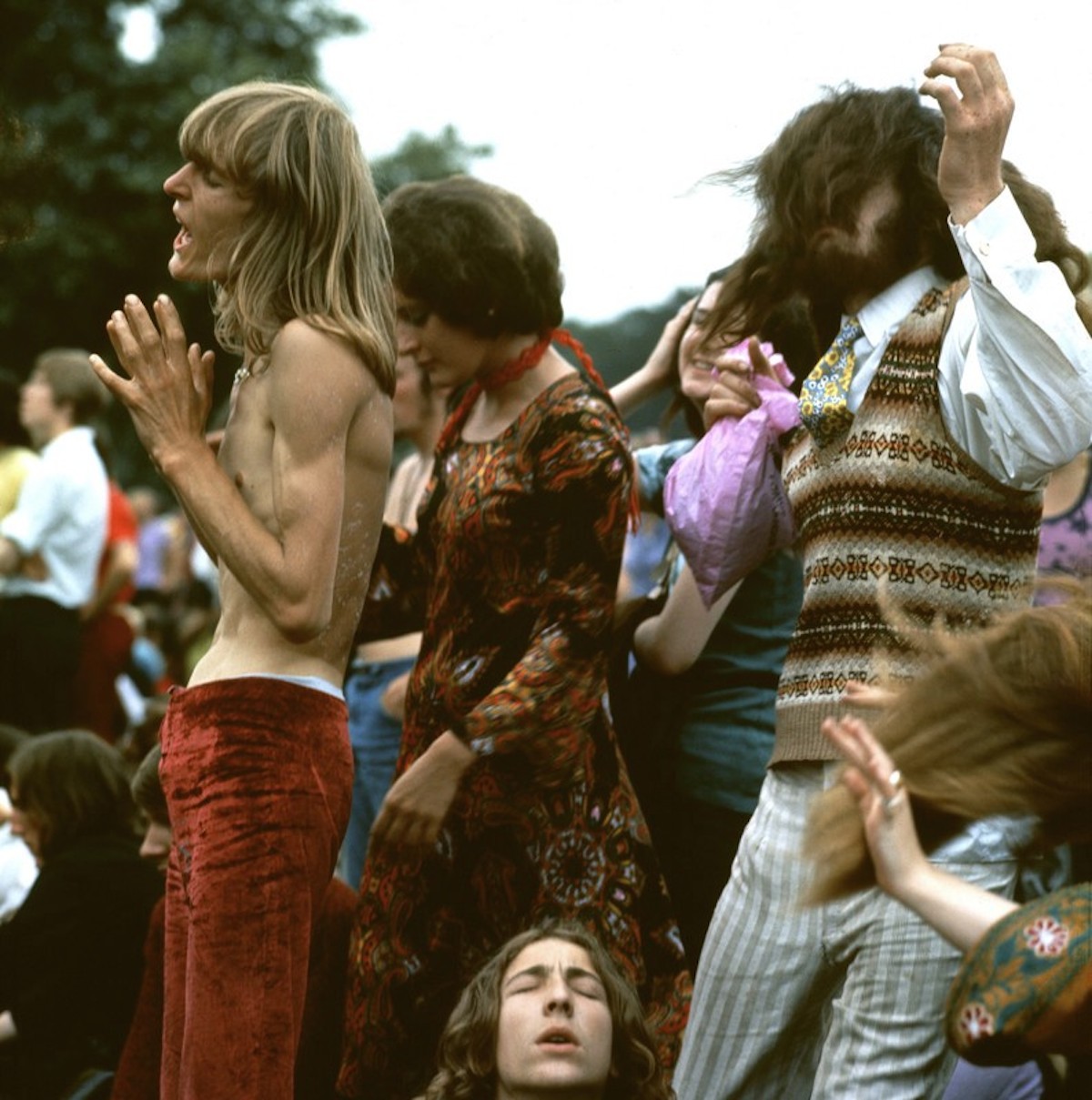
Jellett dancing, probably in Hyde Park, in the late sixties or early seventies (Source- Ron Reid)
When he moved to London, Jellett soon found the “underground” clubs, where the bands he had seen in Southampton played. The Middle Earth club became a kind of paradise for him. As well as Arthur Brown, and Family, there was The Pink Floyd, and Soft Machine, and Tyrannosaurus Rex, and Captain Beefheart, and The Byrds, and The Who, and David Bowie before he was famous. The venue, in Covent Garden, was draped with fruit, to be sold at the next day’s market. Many regulars were given nicknames, and could leave their old lives behind. It was “an alternative universe of incense, bright lights, weird and wonderful clothes, blasts of sound — and fruit,” Nick Butt, the club’s electrician, recalls in his autobiography, Electric Nick. Drugs were rife, and there was a Bad Trip Room.
At first, in this company, Jellett was “sort of normal”, some remember. Some knew him as “d’Abo”, as they thought he looked like Mike d’Abo from Manfred Mann. Others thought he had “a very strange interface with reality”. “He was too out there for me so I have him a wide berth,” one recalls. At Middle Earth, Jellett met Anna Rasle, and they married in September 1968. When he told other regulars, “no one believed him,” Butt says.
Things began to change for Jellett, after he was married.
That month, he saw Jefferson Airplane and The Doors play at The Roundhouse. According to Mick Farren, writing in Give The Anarchist a Cigarette, although Jellett was “usually of benign countenance and disposition, he didn’t seem too happy about The Doors; something was definitely distressing him.” Later, speaking to NME, Jellett suggested Jim Morrison “knew what was going on”. Jellett felt the lyrics of “Waiting For The Sun” — “as first flash of Eden… standing there on freedom’s shore… this is the strangest life I’ve ever known” — were designed “to tell us where we went wrong.”
In November 1968, Jellett was filmed at Cream’s farewell show at the Royal Albert Hall. He is with a woman — presumably Rasle — and flings his head forward, his arms urging on the rhythm during “Sunshine of Your Love”. He wears a brown leather jacket, and a scarf. As the credits roll, he appears again, standing as others applaud, staring in awe. The same month, Rasle introduced him to a band called Uriel, who were named for an angel in “Paradise Lost”. Now a well-known face about town, Jellett used his contacts at Middle Earth to book them gigs.
The next month, he was filmed again, at The Rolling Stones’ “Rock and Roll Circus”. He saw Cream’s Eric Clapton again, backing John Lennon. Jellett smiles and claps and then hops from foot to foot, wearing a striped, hippie shirt. He looks happy. Around this time, Uriel changed their name, to Egg. Jellett told NME that he saw this as a portent, a sign, of a “birth”, a “beginning”. He began to speak about the band so much, some knew him as “The Egg Man”. He told a story about The Crypt, a venue beneath a church, where he saw a band called Infant. They featured a violinist, called Joseph, a carpenter. “Egg?” Jellett said, “Infant? Carpenter?”
It was probably the following June, the day after Jellett’s twenty first birthday, at a Blind Faith gig in Hyde Park, that Jeff Dexter, the DJ from Middle Earth, looked out from the stage and saw Jellett dancing, spotting his long, flowing, white shirt. A cameraman filming the gig noticed him too. Photographs show Jellett’s head bowed, having removed his shirt, with thousands seated around him, some on deck chairs. Blind Faith played “Presence of the Lord”. Eric Clapton, who had been nicknamed “God”, sang and played guitar. Through the microphone, possibly for the first time and certainly the most publicly, Dexter called Jellett “Jesus”.

Jellett, dancing on the right, at Blind Faith, in Hyde Park, June 1969 (Source- Barry Gonen, UK Rock Festivals)
The next month, Jellett was back in Hyde Park, for the “Stones in the Park” show, the weekend after watching Led Zeppelin play at the Bath Blues festival. He saw Family, as he had back in Southampton, back when his hair was shorter and his dancing less free. When The Rolling Stones came onstage, Jellett was caught on film again, with a few other dancers nearby. The month after, Jellett travelled to The Isle of Wight, dancing to Bob Dylan, waving to the people he knew in the crowd.
There was another gig at Hyde Park the next month, this time at the stage at the Speakers’ Corner end of the park. Filmed again, Jellett is onstage, shoeless and dancing frantically, as The Deviants play. A woman tries to remove her flimsy clothes, before a Hell’s Angel wraps his jacket around her shoulders. A small boy in shorts looks on. Later, during Soft Machine’s set, Jellett can be seen beneath a speaker, his arms moving fluidly, before the drums start. Off stage now, on the far side of the security barrier, Jellett is alone.
Dave Stewart, Egg’s keyboardist, would later write in liner notes that, by now, he was no longer the “ex-Barnardo’s child from Southampton whose real name was Bill Jellett” but “naming himself (God knows why) after the Messiah, ever present, whirling like a dervish in his white kaftan and handing out nuts and berries to the audience”. For Mick Farren, The Deviants’ singer, Jellett was “known only as Jesus, one of those freaks who seemed to exist in no other context except mass gatherings . Where he came from, where he went to afterwards and how he survived were a total mystery. He had no visible means of support, no past and no future.”
“Tonight there will be one more thunderstorm and I will know who I am in reincarnation,” Jellett said, that St Valentine’s Day in 1970, after the revelation on the train. He was looking out of the window of his flat, one clean room in a dilapidated, terraced house in Shepherd’s Bush. There was a church on the street, and the sky was heavy again. The room was sparsely furnished, though he kept an old turntable. Over the next few years, he would pin up simple, abstract paintings on the walls, alongside copies of unanswered letters he would send to the media and politicians.
Jellett had once shared the flat with Rasle. They seem not to have been together for long, but their separation clearly left its mark. In a “manifesto” that Jellett wrote in the early seventies, and now available to read at the UK Rock Festivals website, he suggested that he hoped “there would be no more marriages, we would all live together and helping each other, there would be no more lonely people”.
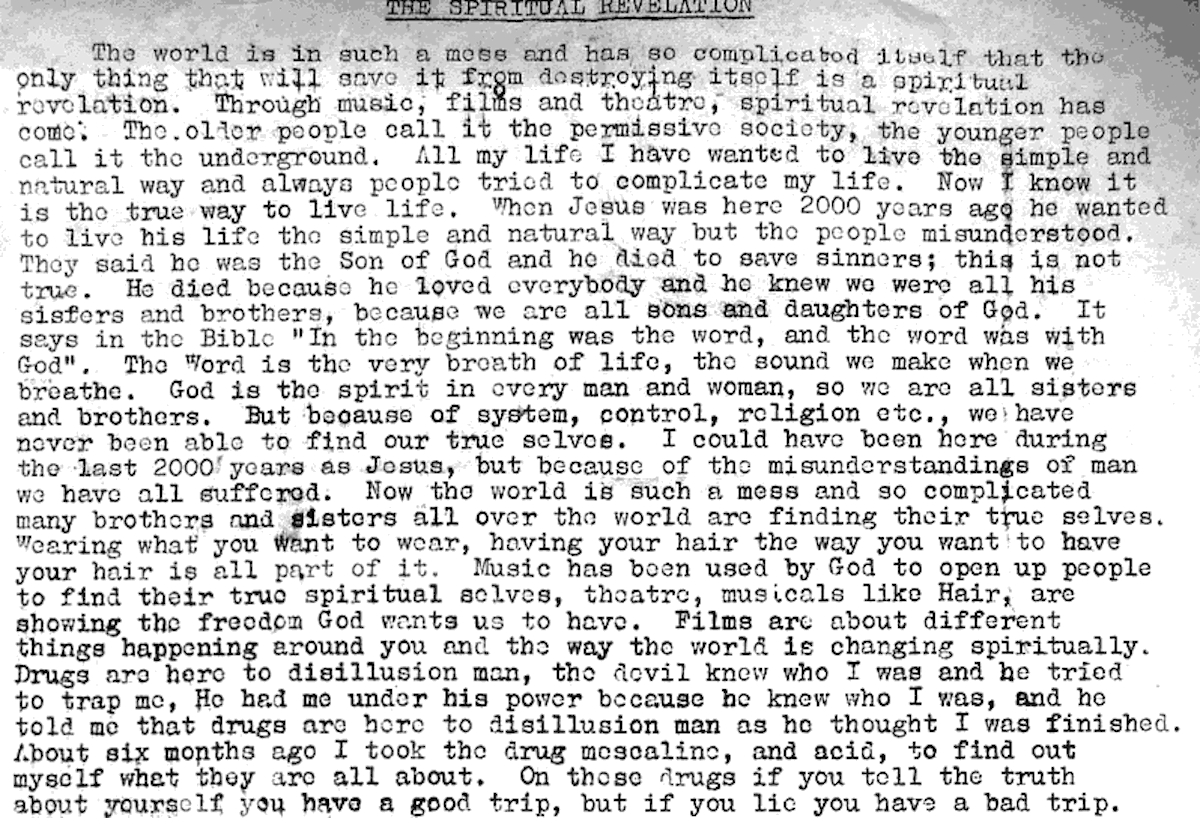
A section of “The Spiritual Revelation”, Jellett’s “manifesto” (Source- Mick Davis, UK Rock Festivals)
At the window, Jellett thought about how his life had changed, with his new life doing cleaning work, without Anna. He would often later preach about needing only enough money for his nuts and fruit, and his room. “Possessions and material things can only complicate your life,” he wrote. That day, he told 19, “I thought about the way I was living — simply and naturally — as far as possible the way of the birds, fishes and animals, and I thought: it would be beautiful to know if I was reincarnated.”
He had first heard about reincarnation the previous week, from Brian Kitt, who he had known at Middle Earth. He told NME that, wearing long robes, Kitt had approached him in Holland Park, while he was playing bongos. Kitt had recently returned from India, he said, and had changed his name, after receiving “spiritual knowledge”. He used his flat as the UK base of the Divine Light Mission, the organisation headed by Guru Maharaj Ji, a thirteen year old Indian boy; “this boy is the reincarnation of Krishna, Buddha and Mohammed,” Kitt said.
A flash lit up Jellett’s room. The lightning was the sign he had wanted, that he had expected.
“I knew…,” he said, “I knew then that I was Jesus”.
Jellett often showed people his stigmata, which he had picked at and rubbed, leaving blisters. Some worried his change in personality had come about after he was spiked, at a party, seeming “normal” one day, “Jesus” the next. Others suggested it had been a longer transformation. He had been a “veteran nutter” even at Middle Earth, some said. Some thought he had done too much acid, and “got much worse”.
Although he would later preach that drugs “cloud our minds”, Jellett seems to have experimented at one point. “About six months ago,” he wrote in his “manifesto”, “I took the drug mescaline, and acid, to find out myself what they are all about,” believing they were “truth drugs”. The devil, though, “knew who I was, and he told me that drugs are here to disillusion man”. His abstinence later became famous. “He was a trip in himself,” one friend remembers.
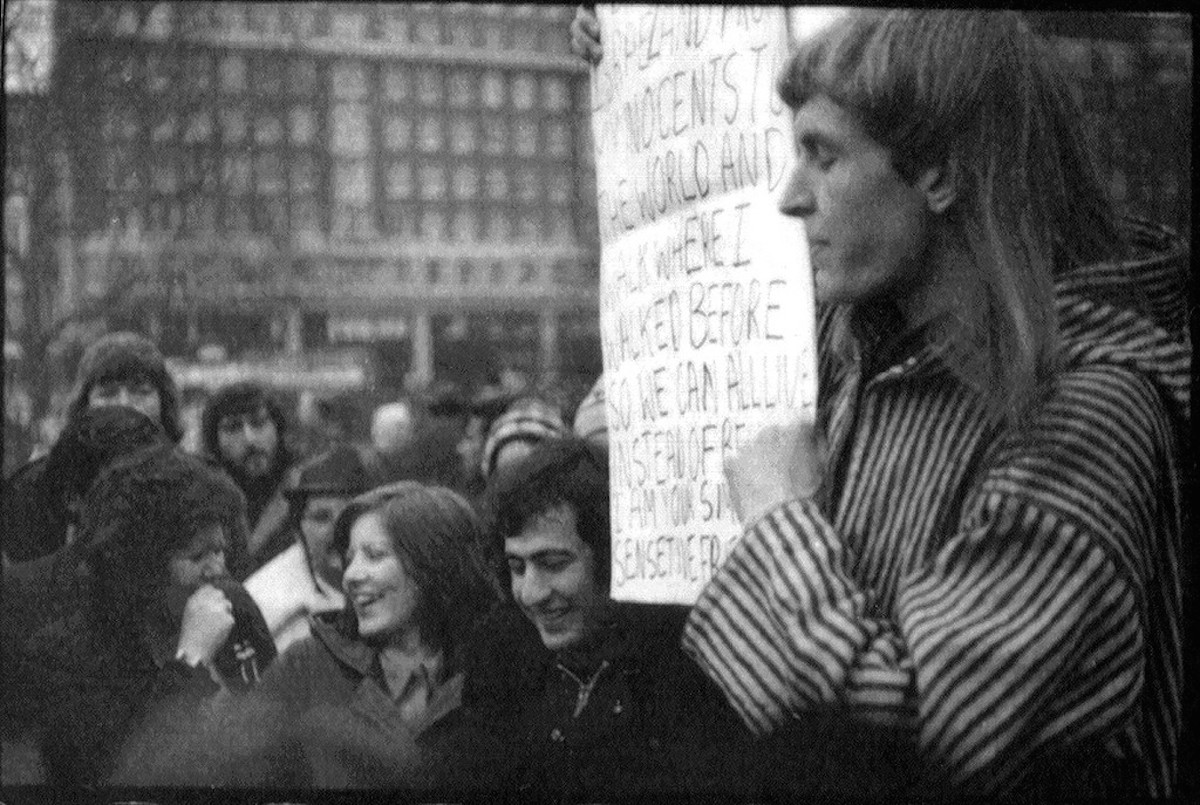
Jellett at Speakers’ Corner, Hyde Park (Source- Smartsetpix)
Music also contributed to Jellett’s new identity, he said, his total embrace of the nickname he had been given at the underground gigs. “Through music, films and theatre, spiritual revelation has come,” he wrote in the “manifesto”, “music has been used by God to open up people to find their true spiritual selves”. There were hints that trauma had played its part too, for this ex-Barnado’s, ex-Salvation Army child finding Jesus. On a placard he carried in the seventies, he wrote that he was a “sensetive [sic] person who has been knowing that I am reincarnated for the last three years. If anyone does you any harm it is because of lack of self-control or not knowing what they are doing”. “As soon as things get complicated I want to get out,” he told NME, “that’s one of the reasons I left the planet before”.
As the rain fell at Glastonbury Fayre in June 1971, Jellett sheltered in the “Jesus Tent”, which had been set up by Christian evangelicals. When the sun came out, according to Jim Buck, who was next to him, his “face shone with light and beauty”, beneath the canvas. Buck was rocking slightly, coming off a “strongly religious, existential trip”, he remembers. Jellett seemed at ease, and calmed him. He introduced himself as Jesus and said that his mother had been Mary but he had a “different mother” now. He was wearing what seemed to be a red, patterned dress, and rows of beads. He held Buck’s hands, and kissed him gently on the cheek. Buck felt reassured. “He was Jesus, as we all were,” Buck says.
Clean-shaven and smiling, Jellett was captured on film at the festival, well-turned out with his blond hair and red robe. He wears the sandals he had made from a pair of black shoes, cutting off the toes. Others seem dishevelled in comparison, as he jigs to Fairport Convention.
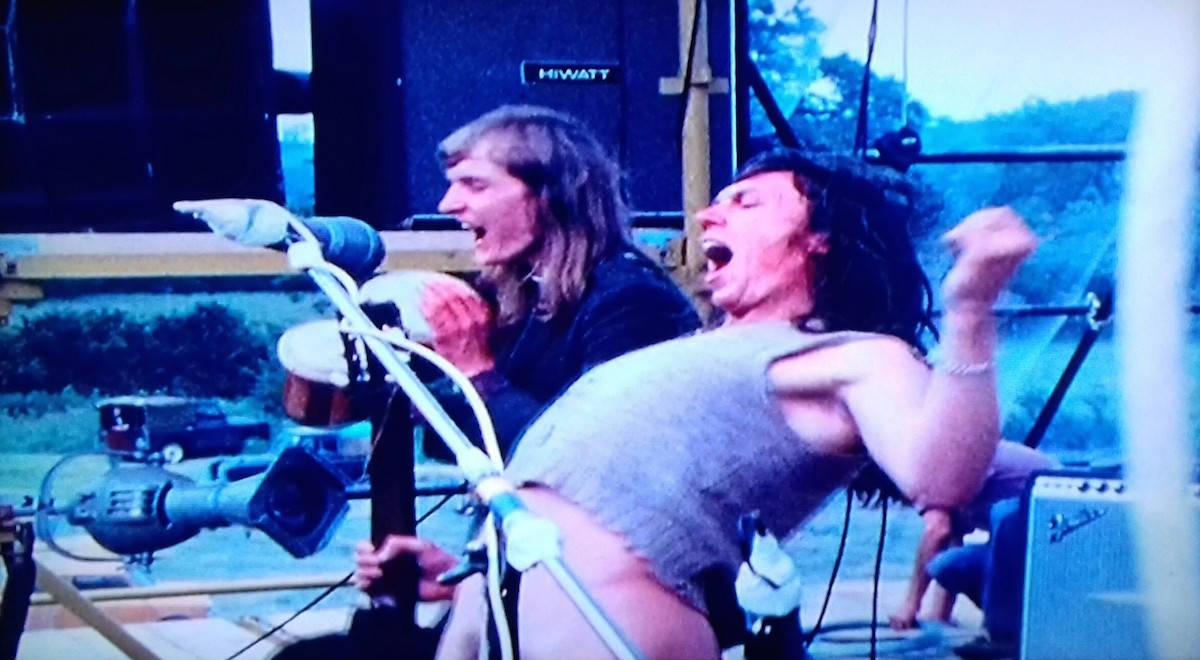
Jellett on the Pyramid Stage, with Magic Michael, Glastonbury, 1971 (Source- Nic Roeg, “Glastonbury Fayre”)
Later, the film shows Jellett onstage himself, with a performer known as Magic Michael. They were often seen together at the clubs back in London. Naked from the waist down, Michael shrieks “your body, your body,” echoing the religious chanting that rang out around the festival. “Thank God, mother, and I can be saved,” he shouts. Less frantically, Jellett joins in, and plays his bongos. Dogs begin to bark. Some in the audience clap. Jellett looks amused, and contented.
Arthur Brown also played that weekend, as did Family, and Guru Mahrahaj Ji preached from his throne. Others rolled in the mud, naked, as children walked alone. At the end of the festival, the organisers exploded three crosses beneath the stage, and the site seemed to be engulfed by flames. This was the freedom Jellett wanted. “I’m completely free of the forces man has created,” he would say later, “which stop him from being himself”.
After his revelation on the train, Jellett began to wear his robes more often, often a white djellaba which he felt was appropriately biblical, “the same kind of clothes as I wore before,” he told NME. Sometimes he pulled the hood over his head, to keep off the rain. He often wore beads around his neck, which he played with absent-mindedly when he talked he talked about himself. Sometimes, at gigs, he took off his clothes, while dancing, and shook his tambourine or played his maracas.
He would often spend his Sundays at gigs at The Roundhouse. “The queue down the steps outside started early,” one regular remembers, “and Jesus was usually there, friendly and smiling, chatting to everyone and giving out nuts and raisins.” It was “like a benediction,” she says. “He would work his way to a good spot for dancing, and just let himself go, even if everyone else was sitting down. Sometimes he would strip off his clothes down to his underpants, in the cause of freedom of movement. He told me he loved Isadora Duncan and admired her for her free dance form. He seemed to think it was his bounden duty to dance and, of course, it was expected of him.”
Looking for this “freedom of movement”, he would sometimes get up on stage, with the band, often asking first. Gary Giles, bass player with Stray, remembers that “he was always very polite, a very gentle soul I think, the only thing we would ask of him was that he kept out of our way on stage when he was dancing about.” “He was never very forthcoming on his own life when we would ask him things,” he says.
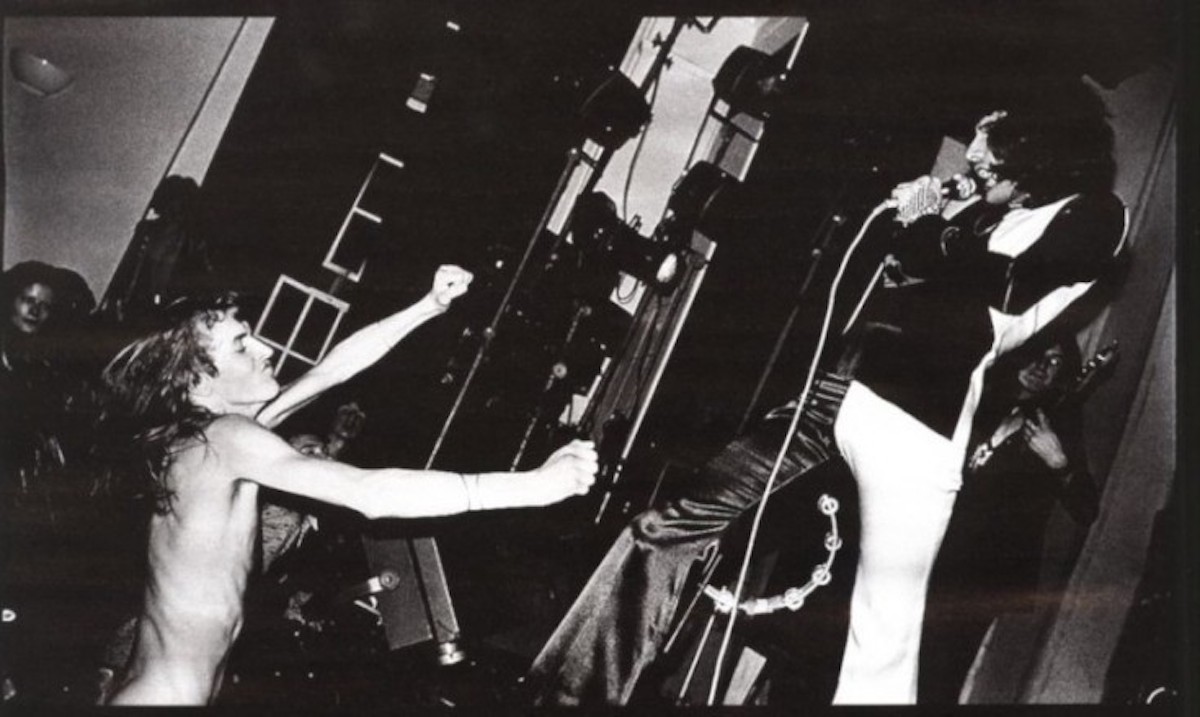
Jellett watching Queen at Imperial College, 1971 (Source- Fanpop)
Jellett cut a mysterious, compelling figure. “Us hippie girls found this kind of boy attractive, skinny, hairless, boyish, gentle and fun,” Sylvie Dupont, a regular at The Roundhouse, remembers. Other women were too shy to speak to him. One, who had danced next to him at Glastonbury, and had heard about him even before that, as a teenager in the suburbs, remembers that he made “a bee line for me” one night. “He was very charming,” she says, “he had a strong charismatic quality, and I was persuaded to go back with him to his bedsit flat”. She became, she says, “the nearest thing to a regular girlfriend he had throughout that period”.
Nevertheless, she says, he was often “eyeing up other girls, especially young, unattached, foreign ones… who were expendable”. “This used to upset me, but I learnt to let it go. It was how he was,” she says. “There were plenty of other fish in the sea for him,” she remembers. “I realised that all that was part of the damage, i.e. no attachment, no commitment, nothing to make demands. He was a product of his rather sad past”, she says, and “of the times”.
Writing on the “London in the 60s & 70s” Facebook group, another woman remembers Jellett suggesting that “it would be good for my soul and well-being, that I should have sex with him.” Another says that Jellett once woke her, ringing her doorbell, to say “that he now knew that I was Mary Magdalene and so we must be together for ever and do the work we were chosen to do”. Others, who had religious childhoods, felt they were being sacrilegious when they slept with him.
“I used to go to Speakers’ Corner with him as his Mary Magdalene,” Sylvie Dupont remembers, “in a long green cape every Sunday.” “He would always carry a bag of a mixture of nuts and raisins and offer some to random people,” she says. These were his “miracles,” Jellett told NME. He paid little attention to the other preachers and polemicists: the old men speaking about Christ, the homeless man talking about his sex life, the Irish nationalists and advocates of Black power. Hyde Park spread out before him.
“We got some funny looks,” the “nearest thing to a regular girlfriend” remembers. She felt “awkward and self-conscious”, but Jellett “was confident and earnest, and genuinely believed in his mission. When he got to Speakers’ Corner, his presence always drew a crowd, and he would hold up his placards and rant. He often had to deal with heckling and ridicule, which he dealt with efficiently and without dismay. He could be strident, and spoke rapidly and sometimes shrill in his self-defence.”
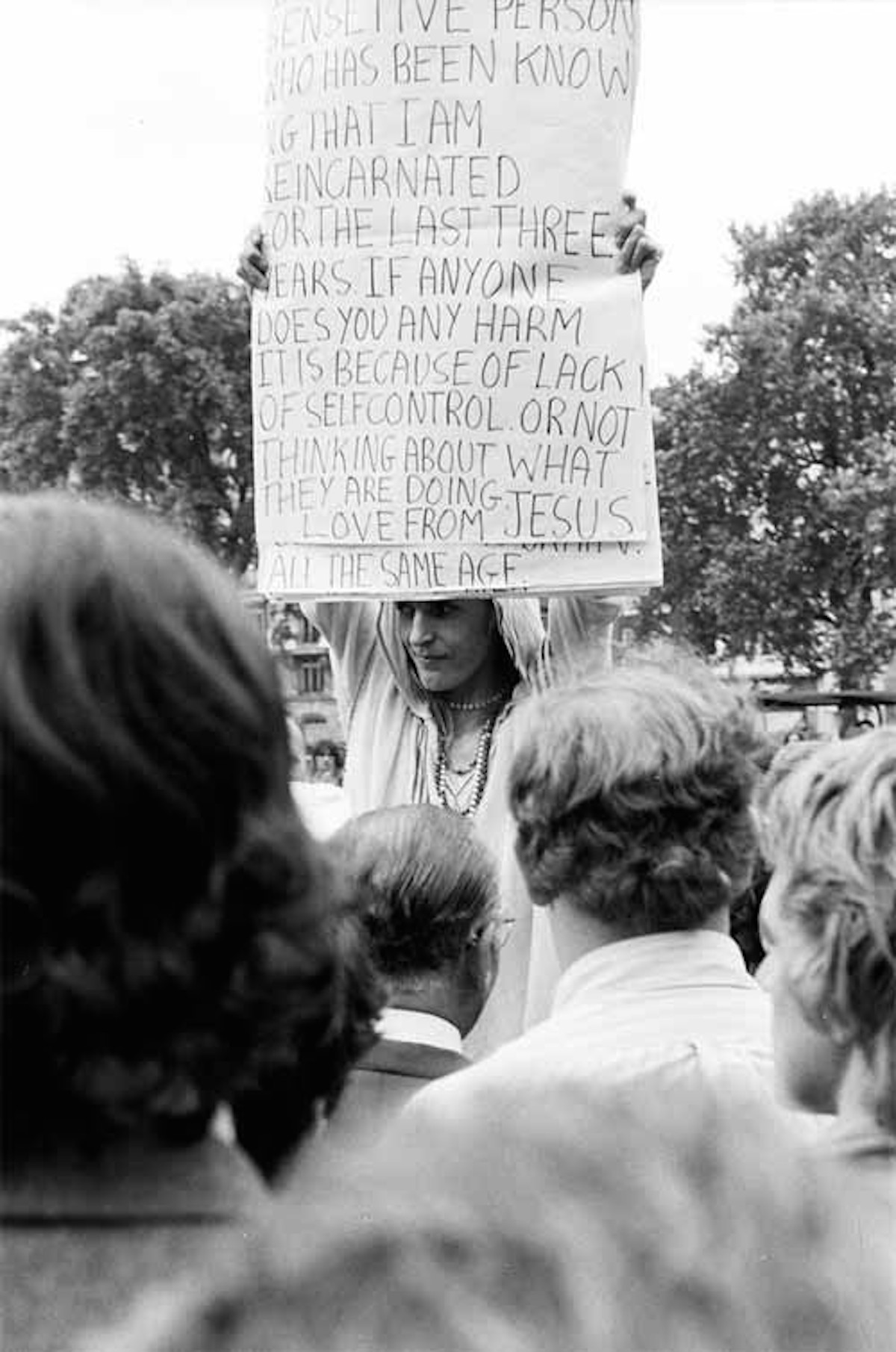
Jellett at Speakers’ Corner, Hyde Park, 1973 (Source- Willem GT, UK Rock Festivals)
“I often felt embarrassed by him, or for him, and was sorry that he felt he had to make himself a target in this way,” she says. “However, he seemed to regard it as a sacred duty to go out and spread his word to the multitudes. I loved and admired his integrity. Even though he might be ‘touched by madness’, he was extremely charismatic and very special. He was a ‘light-giver’. His conviction that he was actually Jesus reincarnated was something I could ignore, or at least turn a blind eye to. I never contradicted him, and nor did I encourage him. I just accepted him.”
Holding his placards aloft — three feet high, all capitals, no punctuation — Jellett would stand on a red plastic milk crate, with his few friends around him. As he spoke, he would move from one foot to another. In his gentle, forthright voice, he preached against drugs, and for music, against eating meat or smoking. Sometimes he wore a Jimi Hendrix badge, and would say that they were similar, and that the “wonderful” ideas of the original hippies had been lost over time. Most of the crowd would drift away. If a friend wandered past, he would say hello, without breaking his stride.
His beliefs, like his rapid fire speech, were difficult to follow. He was certain he was Jesus but, he told NME, “I don’t believe in a God… I believe in The Universe, see?” In his “manifesto”, he explained that “we are all sons and daughters of God,” and should live more like the birds and animals and fishes. “We have been made out to be complicated — we’re not,” he preached. “We must free ourselves from all that’s been put into us. We have no brain, only a mind”.
“By Speakers’ Corner standards, he’s not a good talker,” the journalist from 19 suggested, “but he has a bearing, a dignity, an aura of innocence about him, which his rival orators lack. It’s not so much what he says that makes an impression, more what he is.”
Being Jesus seemed to weigh heavily on Jellett. “I never wanted to be Jesus,” he would often say, “but I realised I was”. “All my life, I have wanted to live the simple and natural way,” he wrote in his “manifesto”, “and always people tried to complicate my life”. Despite the followers, he told NME that he was as a “loner”. “I’d love to go to Israel this Easter,” he explained to 19, “I don’t really want to spend another Easter here. Can you imagine how it feels?”
He often tried, and failed, to gain acceptance. “I went to churches. I went to meetings. I went to lectures and I was always ready to stand up and tell people what I’d found out,” he said. “And you know how they reacted towards me? ‘Go away, you’re interfering’. That really hurt me. I was only trying to help them.” He told NME that staff at the cleaning agency once tried to strip him to look for other marks, after he showed them his stigmata.
Time and again, he tried to interest the media in his message. He was turned away from the BBC, presumably at the same building where he had once worked. He went to the London offices of Rolling Stone so often, they called the police, seeking a “non-molestation” order. He told NME that he had once appeared on radio, where he was dismissed by the Archbishop of Canterbury. “Young man,” the Archbishop apparently said, “if you want to get a message over you’ll have to go about it in another way.”
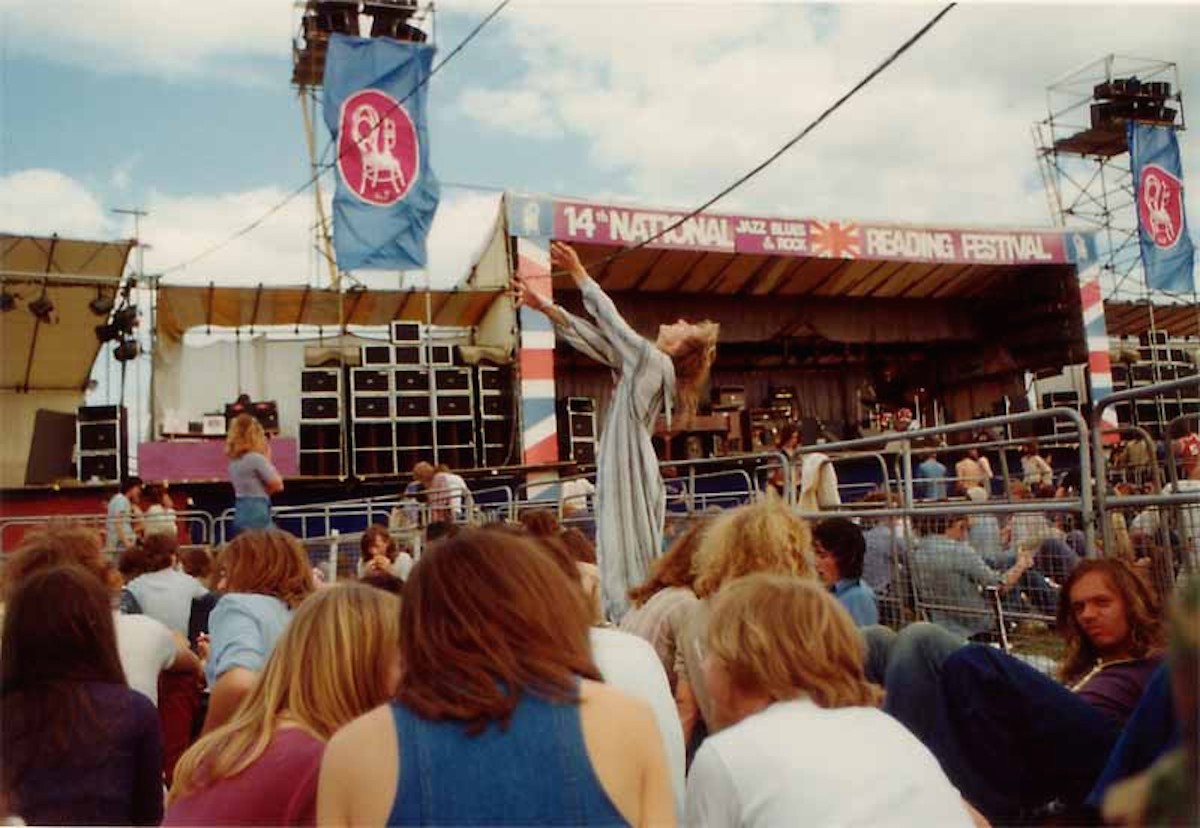
Jellett at Reading Festival, 1974 (Source- Vin Miles, UK Rock Festivals)
Throughout this time, Jellett was increasingly visible at gigs. Watching the Incredible String Band, he danced on his seat, as the audience shouted “Jesus, we love you”. Sometimes, people would throw beer cans at him. He was “an easy target, in more ways than one,” one gig goer remembers. He talked to women about cats, or walked down an aisle, handing out fruit and nuts, or exchanging grapes for front row tickets. At a pub in Ealing, someone recalled, he “jumped on stage and started singing ‘I know it’s only rock and roll but I like it’, before the Stones released song of said title.”
At a Slade gig, in 1971, he banged his tambourine as they played “Know Who You Are”. When the recording of the gig was released, as “Slade Alive”, he was credited as “unknown member of the audience”. He watched New York Dolls in 1972, with the fashionable set, who disliked his robes. At a Frank Zappa gig in 1972, he stood to proclaim that “if you want to know the truth, listen to Jimi Hendrix”. At another gig, “as I started singing,” one musician remembers “everyone began cheering and I thought it was because of me. Then I realised it was because ‘Jesus’ had arrived in the audience”.
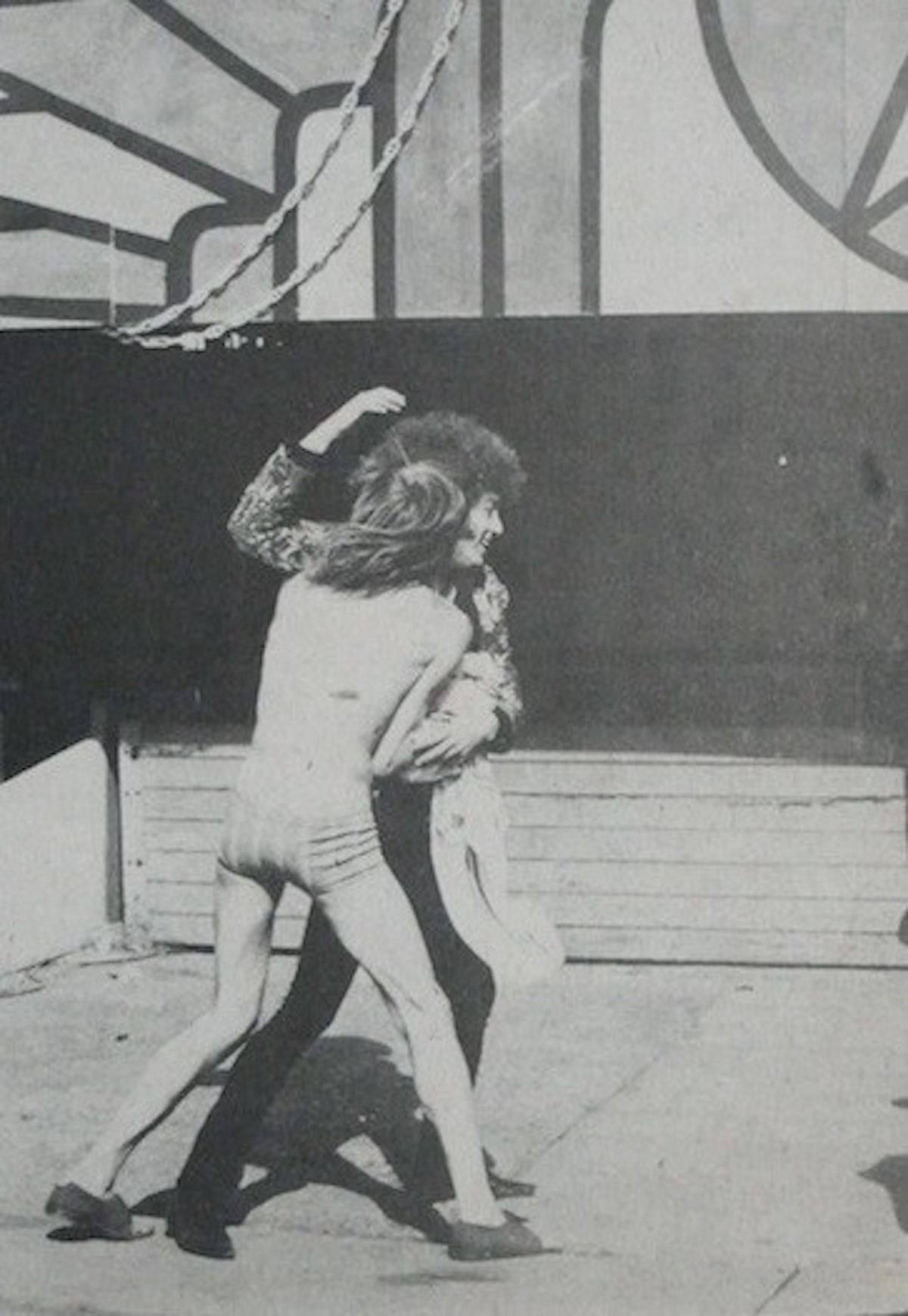
Jellett and Rob Tyner, of The MC5, pictured in Frendz magazine, 1972 (Source- Paul Gorman)
Jellett’s ubiquity led to attention in the press. In 1972, he was pictured prominently in Frendz magazine, in his robe, ecstatic, and then, wearing only a small pair of pants, grabbing Rob Tyner of The MC5. The 19 magazine profile appeared in 1973, which focused on his preaching. The NME profile appeared in 1974, where he spoke about music, and his upbringing. In both, he told the story of the revelation on the train. Nevertheless, the NME journalist noted, “Jellett always flicks the safety catch off his Verbiage Gun whenever questions demand a clear-cut answer.” Questions about “whether he’s ever seen a psychiatrist, remain unanswered.” Jellett was clearly conscious of his image. “I think the face and hair are the most important things,” he said to the photographer, and made sure to show him the stigmata. The NME article carried a picture of Jellett naked, with a cross superimposed over his genitals.
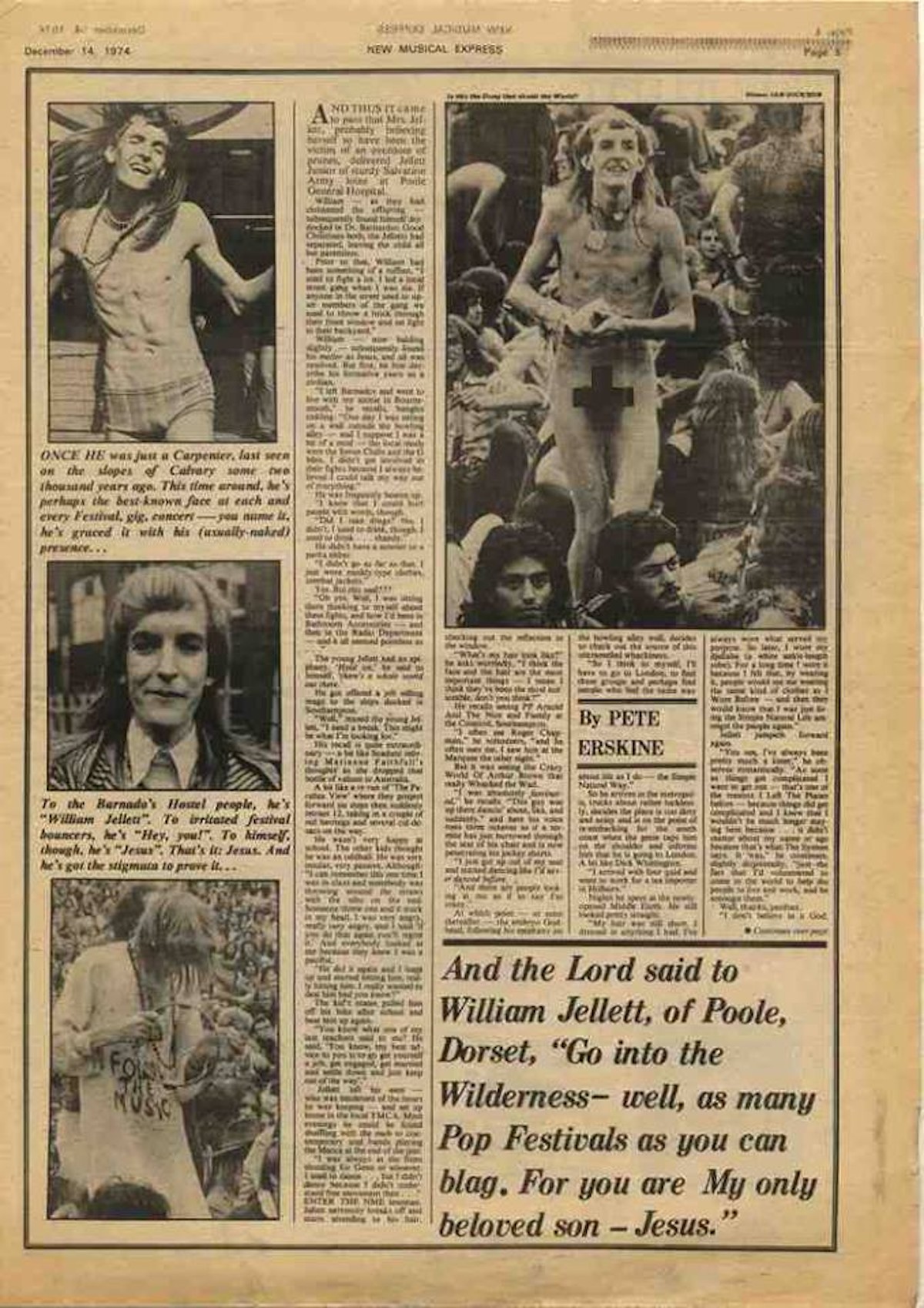
The NME profile of Jellett, 14th December 1974
After the magazine profiles, when he had become a kind of celebrity, some crowds would “call him by his real name — Bill — which seemed to upset him,” one gig goer remembers. “He stood up to all sorts of jeering and shouts to ‘sit down’,” another remembers, “happily ‘idiot dancing’ as plastic bottles of piss fell all around him.” Footage shows him parading at the Notting Hill Carnival in 1973, with his bongos, marching like his Salvation Army relatives before him. He went to Reading, and the small Welsh festivals, that were “awash with acid”, another recalls.
In 1975, at Knebworth, Roy Harper noticed him dancing in the front of the stage, as ever. “You still about, man?” Harper apparently asked. “You’re as played out as I am”. At another festival, he removed his clothes, high-kicking as Hawkwind played. A young girl sat beneath him. He was filmed dancing naked at a UFO gig, at The Roundhouse, clapping and waving his tambourine, facing the crowd. Once, at another gig at The Roundhouse, when Jellett “was dancing starkers,” a fellow attendee suggests, “a dog was trying to bite his willy”. At a Queen gig in Hyde Park, he carried an upright vacuum cleaner. Some thought he was “vacuuming sins”.
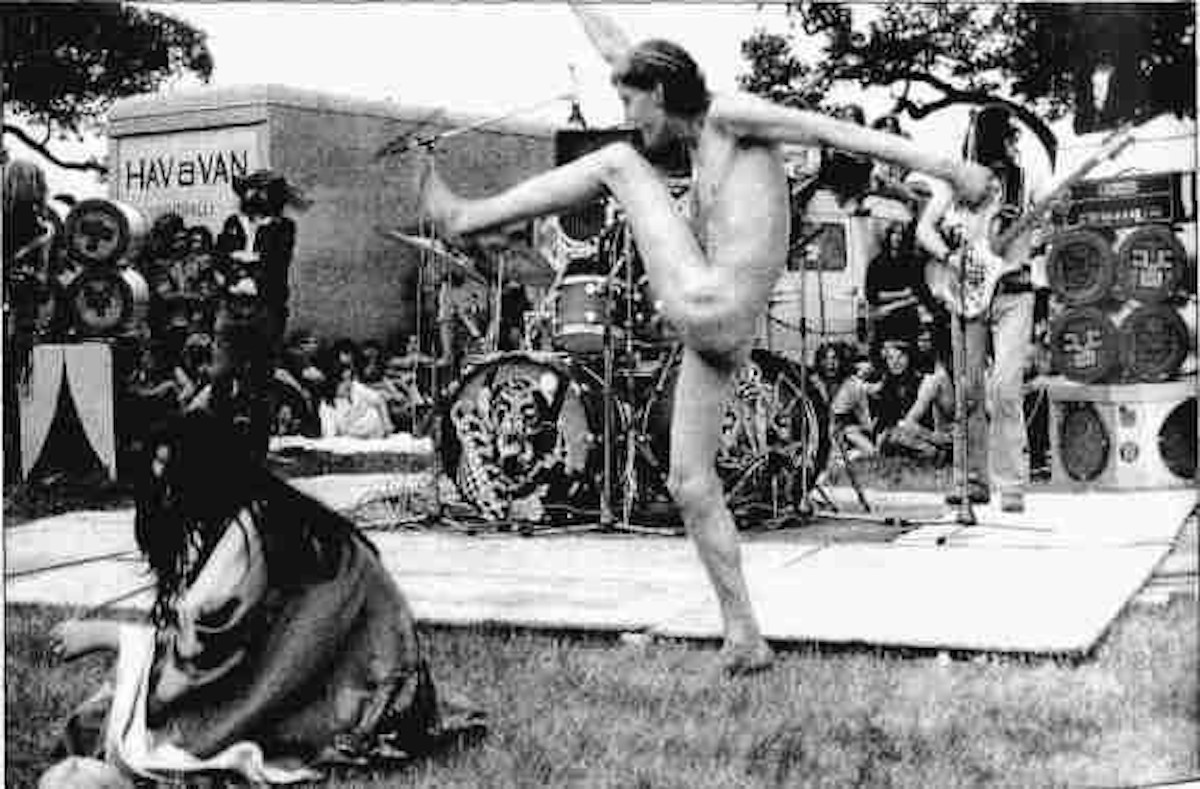
Jellett dancing in front of Hawkwind, Windsor Festival, 1974 (Source- UK Rock Festivals
John Lydon remembers him from this era, as hippies began to fade, and before punk was born. “He’d strip naked, he had the smallest willy in the world, and he didn’t give a toss who looked,” Lydon wrote, in Anger Is An Energy. “I loved him for that. I thought, ‘he doesn’t care, and look, he’s completely happy. He’s got bongos which he doesn’t know how to play, no sense of rhythm — none! — but a total sense of joy. He certainly wasn’t what my mum and dad had in mind as Jesus. But his message was good.”
Jellett’s favourite venue in the mid-seventies was The Marquee. He had been going since the sixties — Anna Rasle had worked at a coffee shop farther along Wardour Street — and stayed, for decades. He was conscious of his longevity, and his age, but seemed unfazed by it. “Names and ages are immaterial,” he told NME, “but The Universe knows there is a system”. “My favourite song is ‘You Ain’t Seen Nothing Yet’,” he said. “It sums it all up really.”
“Jesus had a certain aura about him,” Nigel Hutchings remembers, who managed the The Marquee from 1975 to 1986. “Every now and then I would let him in free as he was, I suppose, an attraction in himself”. “He visited The Marquee more than the cleaners,” another regular remembers.
“Jesus had a rating system,” another recalls. “If the band were good he got his tambourine out, but if the band were really good out came the maracas.” He got up on stage only with the best, he says, something Jellett was apparently very “strict about”. “If he walked away (which I saw him do a couple of times),” another suggested, “the band might as well pack up and go home.”
Peter Egan, who worked in the bar between 1975 and 1977, remembers that “a hard rock band would naturally attract a different set of punters to say a folk band but that never bothered Jesus”. “That particular time in the mid-seventies,” he says, “the hippies for the most part were quietly discarding the afghan coats and flares, getting the haircut and becoming stockbrokers and estate agents. Jesus stayed true to his lifestyle. Oddly enough, I never knew the man’s real name”.
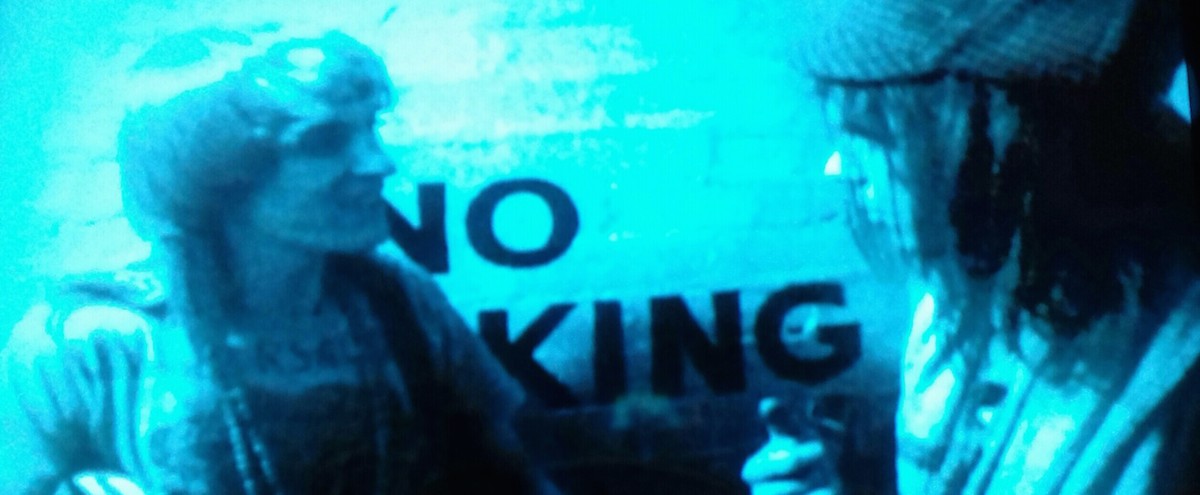
Jellett and Neil Young, backstage at Hammersmith Odeon, 1976 (Source- Jim Jarmusch, “Year Of The Horse”)
By now, Jellett seems to have felt he could offer some kind of perspective on the music of the sixties. In 1976, backstage at a gig at Hammersmith Odeon, he met Neil Young. The encounter was filmed, and later made it into Jim Jarmusch’s “Year of The Horse” documentary. Jellett is calm and smiling, but speaks urgently. He had written “universal” on his t-shirt, and drawn a heart underneath. He wears beads, and carries a tambourine, in front of a “no smoking” sign.
“San Francisco was, you know, the rebirth of the planet,” Jellett tells Young, “and if people knew the truth about how I lived my simple, lovely life in Israel before and if they had known what really happened in San Francisco…”
“In Israel?” Young replies.
“In Israel, yeah.”
“Oh, I see.”
“…because 2000 years is just like yesterday, you know? Every day is a new day, living, working, loving, the universe, all over this planet, that’s the way I live my life.”
“Well that’s great. Good luck to you.”
Young glances at the camera, with half a smile. “Hope you make it this time. Last time was rough.”
The same year as the Neil Young gig, John Lydon was surprised to see Jellett at an early gig by The Sex Pistols. “I think it was at the Marquee,” he wrote, “when we were supporting Eddie and the Hot Rods — he was there! He looked completely different, he had a suit on, but he still had the same ludicrous hairdo, which was a very deep fringe and a long mullet at the back, and deathly blond”. In Nils and Ray Stevenson’s “Vacant”, there is a photograph of Jellett dancing blissfully at The Nashville Rooms, as Lydon sneers behind him, and behind him, Chrissie Hynde, later of The Pretenders, looks on.
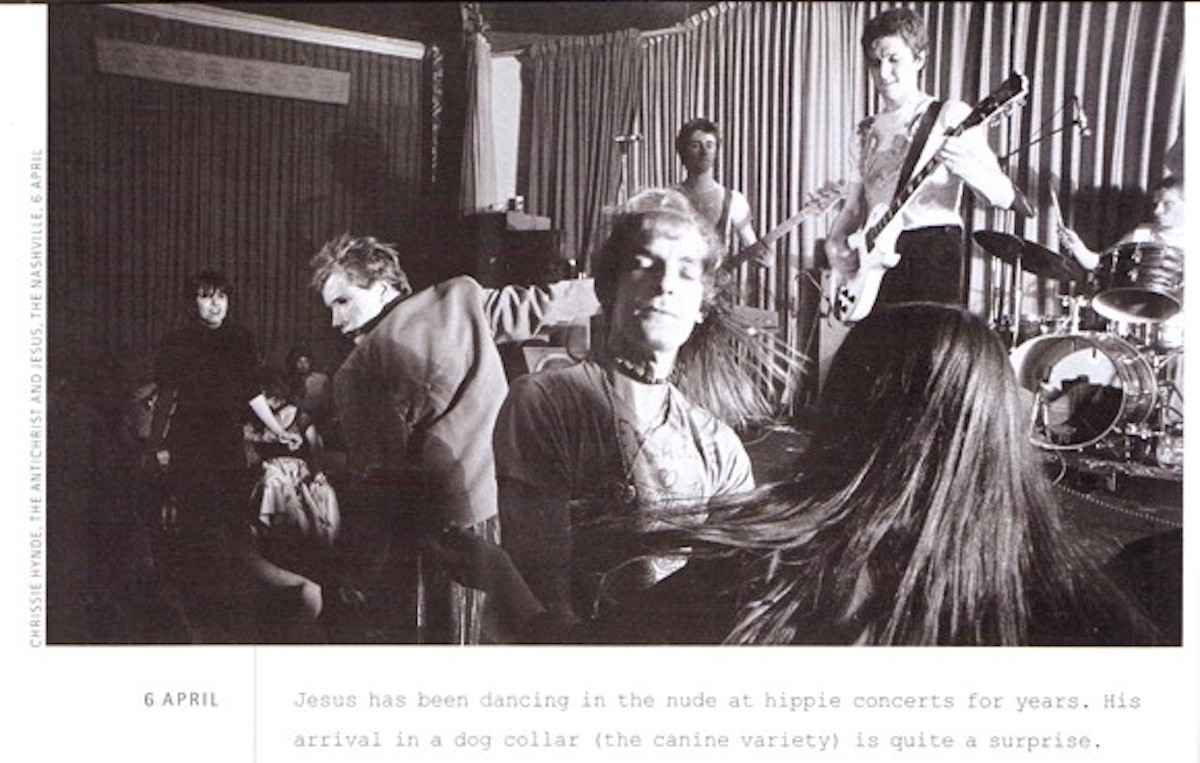
Jelllett dancing to The Sex Pistols, 1976 (Source- Nils and Ray Stevenson, “Vacant”)
Jellett saw so much live music, he couldn’t miss punk: The Ramones, The Stranglers, Patti Smith, and Ian Dury. Bands that are now forgotten invited them to their gigs at less well-known venues, and were delighted when he arrived. Initially, according to writer Paul Gorman, punk crowds took to him well. “He was just another weirdo and most people had seen him before,” he says.
After a while though, Jellett seemed to suffer. At a gig at Crystal Palace, he was thrown in a lake by skinheads. According to punk musician Shanne Bradley, Shane McGowan once “pogoed off his shoulders”. At a Lene Lovich gig, a pair of teenagers shouted at him, telling him to “get a wash”, suggesting they would “kill the hippie”. They stopped only when someone pretended that Jellett was a friend of Mick Jones, from The Clash. At a Stranglers gig, according to one who was there, he seemed “meaner” than before, “as if going along with the fashion but he still danced down the front”. A story did the rounds that Sid Vicious once taunted him at a Sex Pistols gig, before Marco Pirroni, later guitarist in Adam and The Ants, intervened, as “the hippie would have slaughtered Sid”.
Jellett had become a figure of fun by then, as he turned thirty. He often saw bands he had seen when he was twenty. At a Bob Dylan gig in 1978, one friend tried to avoid Jellett by hiding behind a parked car, before his girlfriend, a “devout Catholic”, offered him a lift home. “When we got to his flat in Shepherd’s Bush, he made tea, brought dates and figs for us to eat. Jayne then asked if he was famous, and what his name was. When he replied ‘Jesus,’ she looked a little uneasy, but when he explained that he was “the” Jesus, and started some rap about my name, Peter, and something about a rock, and building something on it, the truth began to sink in, and she seemed to be in a hurry to get out”. That year, he was seen “gradually divesting himself of his clothes” at Knebworth, then again in the same spot in the next year, watching Led Zeppelin. Eddi Reader, later singer with Fairground Attraction, remembers rejecting his advances as she busked in Hyde Park.
Hippies became a thing of the past, and a source of nostalgia. There was a “Bohemian Love-In” at The Roundhouse, aimed at the old Middle Earth crowd. Melody Maker noted that “Jesus was there, of course, announcing that Eternal Youth is the only cleaner”.
Music had changed again. He saw Judas Priest , and Joy Division, and Ultravox, and the Yellow Magic Orchestra. “To us youngsters, he was like the last hippie standing,” one gig goer remembers.
When John Lennon was murdred, in December 1980, Jellett went to see a mod revival gig near his flat. A band came on, all dressed in black, in mourning. “He came up to us with some advice,” the band’s singer, Danny Holloway remembers, “‘you shouldn’t dress in matching clothes’.”
At another gig, a couple of years later, Jellett was pictured dancing in the rain. “The weather was patchy, and people were sheltering where they could during showers, but there was Jesus in his brightly-coloured shorts and nothing else, shaking his maracas,” the photographer remembers. He wore real sandals, rather than the homemade version he had worn for years before. There is what one gig goer remembered as “a bald halo on the crown of his head”. He is alone, again.
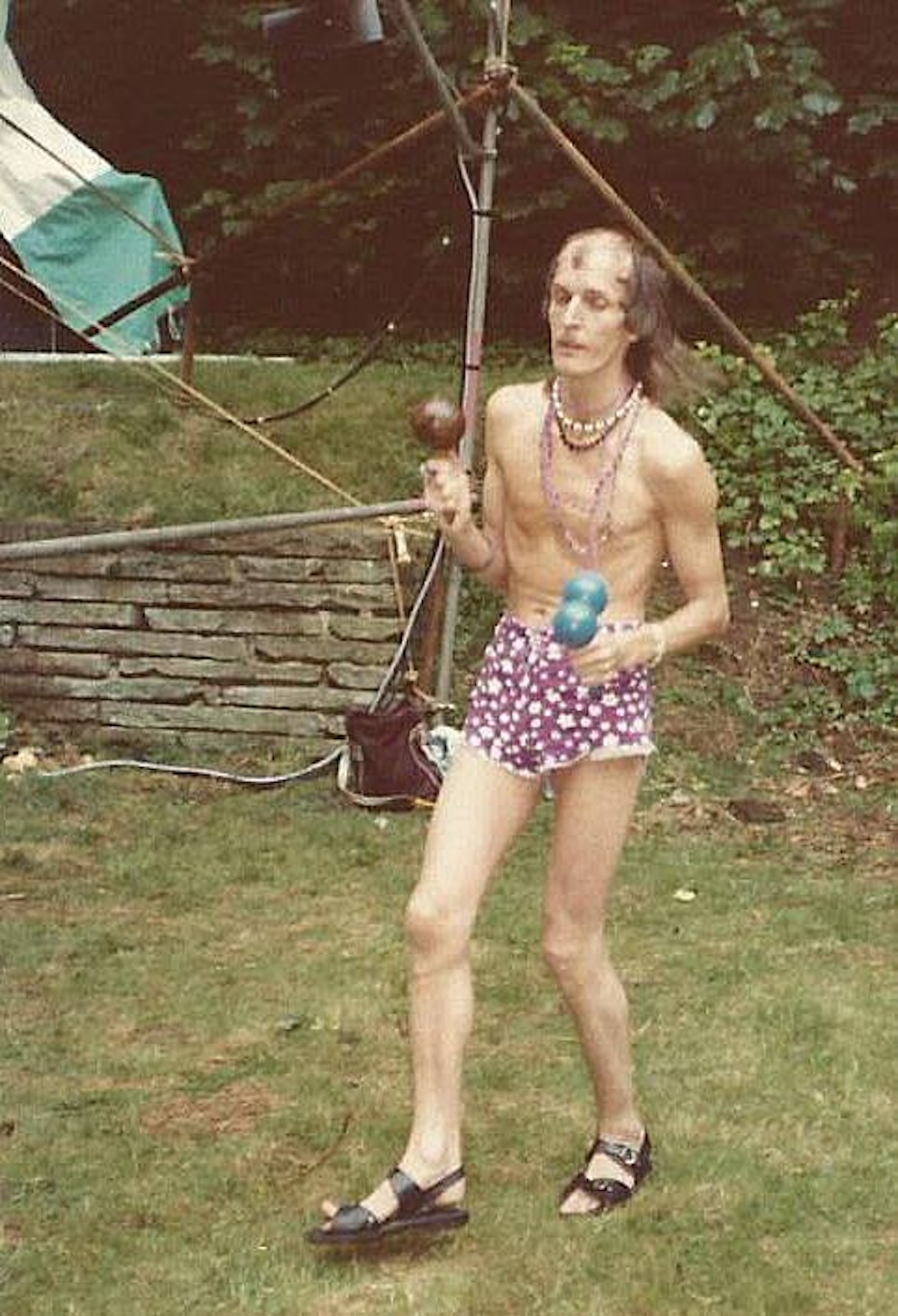
Jellett dancing at an open air gig in Hitchin, early 1980s (Source- Oz Hardwick)
Jellett still often appeared on stage — his penny whistle can be heard on the bonus track from Stray’s “Live At The Marquee” recorded in 1983. At the same venue, Phil “Philthy” Taylor, the drummer from Motorhead, apparently punched him off the stage, for refusing to stop playing the bongos. As he fell, the crowd stepped aside. Minutes later, he reappeared, dancing.
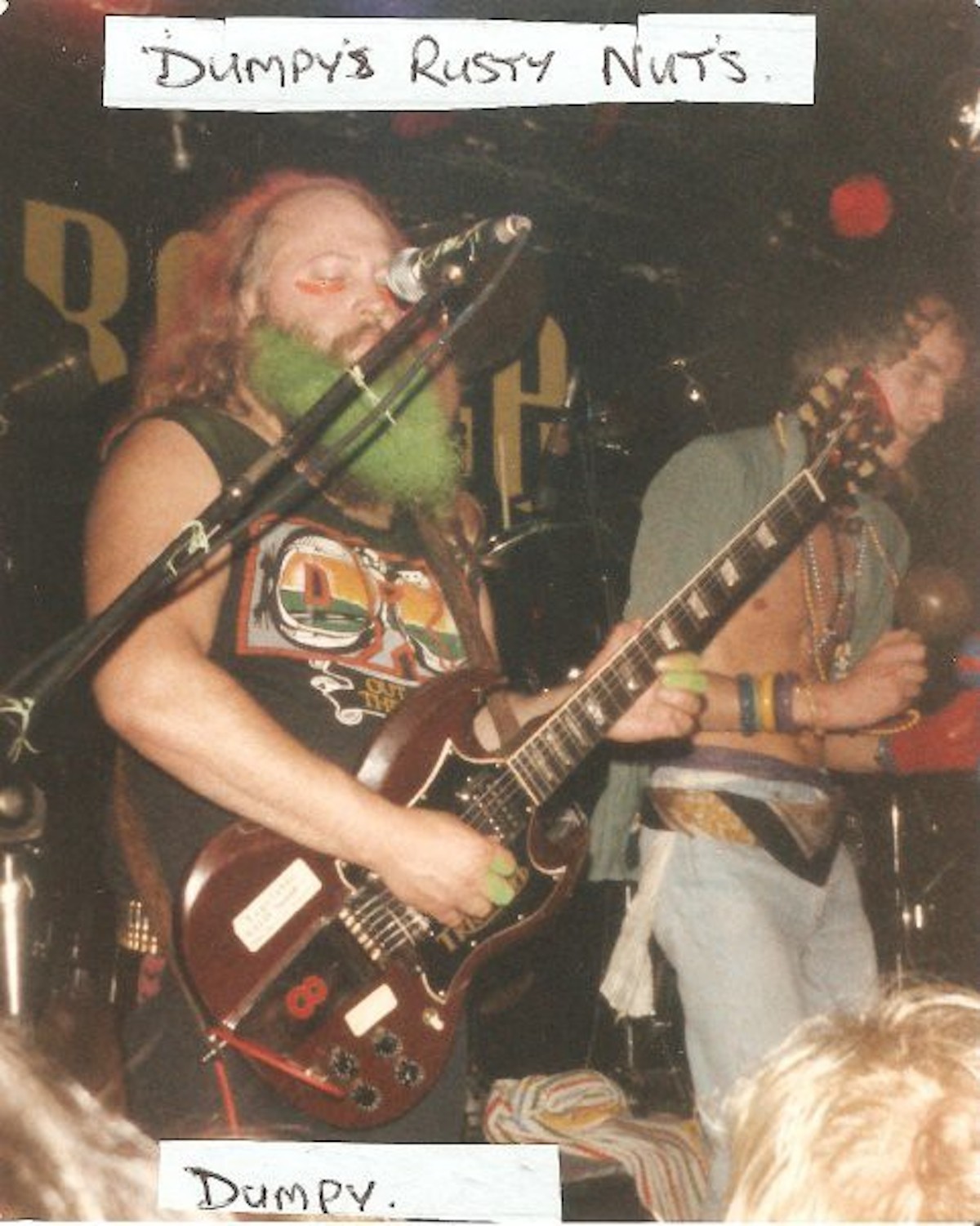
Jellett onstage at The Marquee, with Dumpy’s Rusty Nuts, 1986 (Source- Elisabeth Anne)
Jellett barely slowed down as the eighties went on. In 1985, at an “Anti-Heroin” gig, he watched Hawkwind share a bill with Vera Lynn. In footage from a 1986 Dr & The Medics gig, he waves a banner in the audience: “nature is a friend”. His shirt is unbuttoned. The rest of the audience, ten or fifteen years younger than him, wear hippie-ish clothes, back in fashion, and their hair is long. Most appear unmoved. Some dance, though more muted than Jellett. Other footage from the time shows him wandering aimlessly between songs, still at The Marquee, and hopping and banging his tambourine as the band start to play.
By the early nineties, he was an institution; he had been going to The Marquee for longer than some of those in the audience had lived for. One night, the DJ announced that Jellett had sent his apologies, as he would be absent for a while, due to an ingrowing toenail. Some bands felt “blessed” when he danced with them onstage, such was his renown. When The Marquee closed in 1988, and re-opened in Charing Cross, Jellett went too. Having turned forty, he avoided the mosh pit at a Sepultura gig. He still went to Speakers’ Corner, sometimes talking about the significance of the Blue Oyster Cult symbol, the “cross with the question mark”.
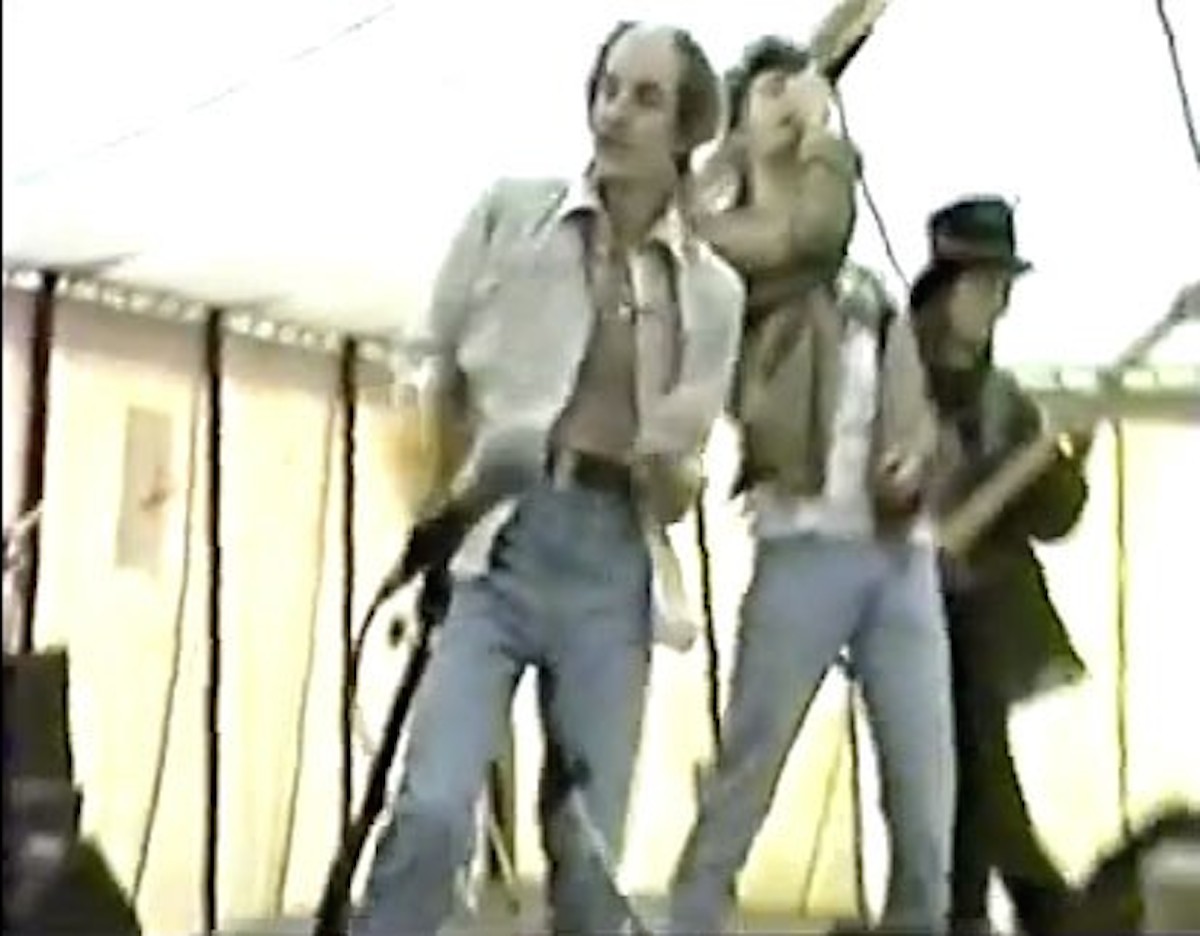
Jellett onstage with The Mustard Seeds, 1992 (Source- Bill, UK Rock Festivals)
In footage from a Last of The Teenage Idols gig from this time, he can be seen on stage, shaking his tambourine. He wears a hat, covering his bald head. The band’s singer, Paul Mulvey, also known as Buttz, remembers that “he kind of followed us for a while”. “I travelled to one of our shows with him on a tube. He was arguing with someone that had pushed into him, and now he was going to make it rain on their house for ‘years’,” he says, “I was too scared to refuse him stage access, in case he plagued the tour with locusts and shit.” In 1992, the year Jellett’s mother died, he was seen at a “pagan rock” gig, and at a gig wearing a shirt on which he had written “one music peoples energy universe”. At another, he jumped on stage, when the band covered “Sympathy For The Devil”.
There were a few more“sightings”: on Oxford Street, waving; preaching at Speakers’ Corner; at a festival, making the audience feeling nostalgic; at demonstrations against the Criminal Justice Bill, which targeted “repetitive beats”, where he danced, and shouted “drugs destroy your minds”.
Then, he stopped going to gigs.
He disappeared.
Flyer distributed by Jellett in 2000, at Speakers’ Corner (Source: Matthew Cheeseman)
“My name is William and I was 52 on June the 6th,” Jellett wrote in a flyer he distributed at Speakers’ Corner, in 2000. He tried to explain his absence from gigs for much of the nineties, and to reassert his longevity. Closely written, in capitals, and riddled with spelling mistakes and contortions, it seems different even to his writing in the seventies. It is bitterly sad. “I stay in my flat for 10 years I watch the televition and listen to the radio I stop to dance play music and then Oasis single came out Let It Out,” he wrote. “Then I came out and started to dance and play music again and the weather change for the better. Then I knew the soul was working again… I am living my life on this planet the same as I did in the summer 1970 when I was first made aware I had the same soul as Jesus.”
He still saw significance everywhere. “I was the piper at the gates of dawn. Pink Floyd. I was the piper in the stairway to heaven. Led Zeppelin… Purple is for pain or rein. Red is for love or danger. Blue is for true. Green is for grow or grown. Black is for the end. Brown is for the Earth. Yellow is for the Sun. Orange is for nature. White is for peace.” Marble Arch, which he could see from where he preached, became “Marble (Rock) Arch”.
Those who saw him at Speakers’ Corner at this time remember he had pictures of Queen album covers, and wore one knitted glove, which he said was a “sign”. “He told us had informed Scotland Yard and the BBC about his deity status,” one recalls.
Just as suddenly as he had stopped, he began to go to gigs again, often bands that he had seen in his youth: King Crimson, Van Der Graaf Generator, Magma. In 2003, someone thought they saw him at Glastonbury, “looking very thin and bony. His hands looked skeletal.” In 2004, he went to a Stray gig, for the first time in years. Jeff Dexter, the DJ from Middle Earth, saw him “when there was an attempt to re-launch La Discotheque premises on Wardour Street as a new rock venue. I passed him on the stairs on my arrival, as he was leaving to go home. I chatted with him, inquiring if he was still ‘idiot dancing’”. Jellett rolled up his trouser leg, and showed Dexter his varicose veins.
He did though find a new venue to call home. “He reappeared at the Royal Standard, Walthamstow, still with his maracas,” John Mills, a regular there, remembers. There were battle of the bands nights, and tribute bands to Yes and Led Zeppelin. “He was very polite and clean. And looked younger than I expected,” Mills says. Some in the crowds suggested avoiding drugs and alcohol had kept him young.
One night, Mills says, “on the tube, after a gig he declared to the whole carriage that he was the reincarnation of John Lennon, Bob Marley and David Bowie, then giggled when he realised that David Bowie was still alive.” Some on the tube were interested, but most ignored him. Once, according to another regular, “he got chucked out by security, for jumping up on stage with his tambourine, while the band were playing.” “LOL,” he typed, on Facebook.
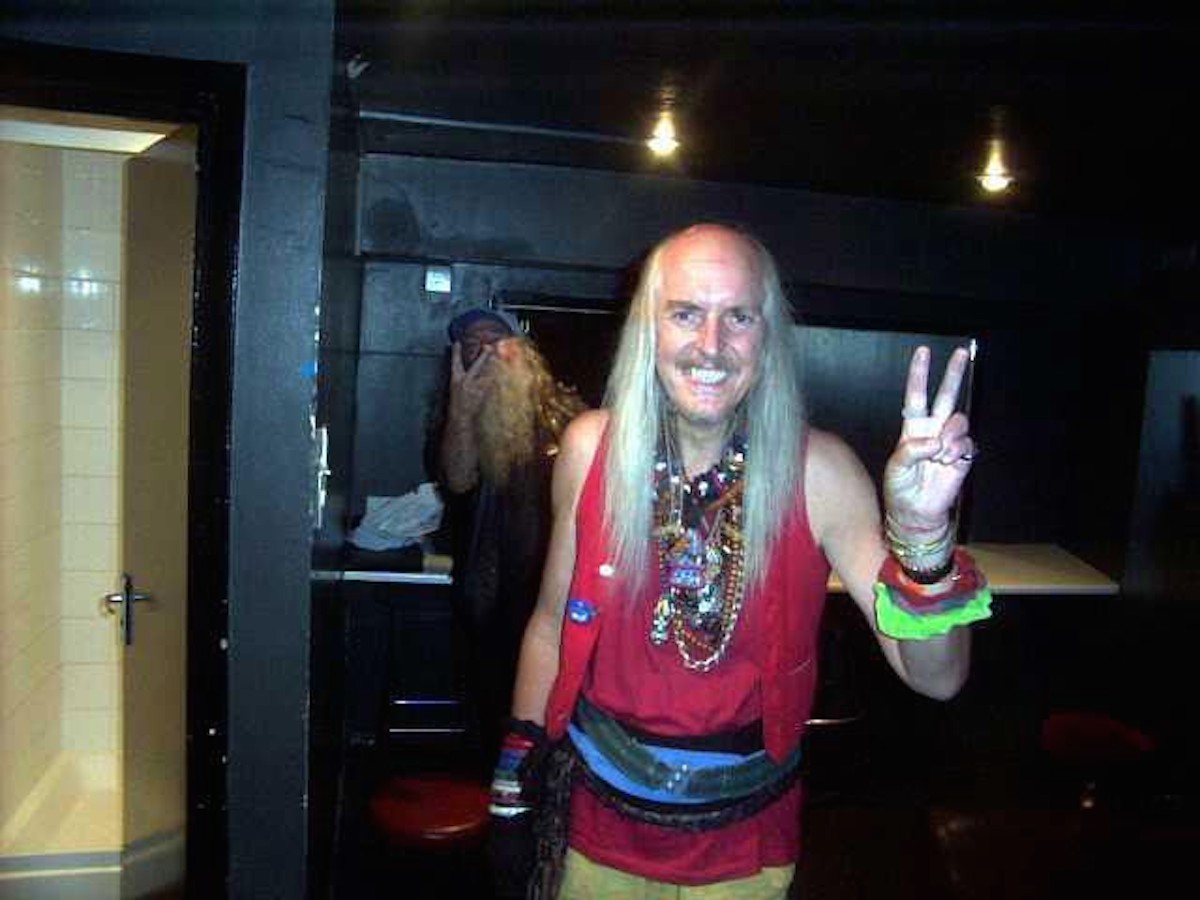
Jellett backstage at the Camden Underworld, in 2004, with Dumpy behind him (Source- Elisabeth Anne)
The last known photograph of Jellett was taken in the summer of 2004. He was backstage at a gig by Dumpy’s Rusty Nuts, at The Underworld. He had seen them a lot back in The Marquee days; the band used to stop, mid-song, to point out that he was in the audience. Now, Jellett’s hair was white, still long down the sides, and completely bald on top. He wore florescent clothes, and made the peace sign, beaming. He gave Dumpy one of his cryptic pamphlets. It was a nostalgic night. Jellett was a “blast from the past,” one fan remembered. Another suggested that “seeing Jesus again made the evening complete”.
Few saw Jellett after that. He went to The Royal Standard a little more, until 2005 or 2006. Shanne Bradley saw him at a gig in about 2005, where she chatted to him. “He knew all about what Shane [McGowan] and I had been up to,” she recalled, online. Someone thought they say him at a Cardiacs gig. “He seemed quite frail,” one audience member said. “He had a stick and was being supported by a couple of friends coming down the stairs from the balcony at the end of the night.”
He was occasionally seen around west London. “He was in a bad way,” one person suggested on Facebook, “I didn’t even recognise him, but last I saw him (in the park) he was a lot better.” He may have been at another Stray gig, in 2011, or watching Lynyrd Skynyrd. Another thought they saw him at the Jazz Café. Then, the sightings stopped.
He had disappeared, again.
In Jellett’s absence, stories began to circulate online. “Seems every Facebook group I’m in is turning up photos of Jesus at the moment,” one person commented on a group dedicated to memories of The Marquee. “I wouldn’t be surprised if he’s remembered just as well as some of the bands we all supported,” someone said. “He’s a star here,” another posted, on the “London in the 60s & 70s” group. “I’ve certainly seen more comments about this guy than any other ‘civilian’ on Facebook over the last few years,” Nick Butt wrote on the Middle Earth group, “maybe he really is a deity.” “If he is still around, or resurrected, I do hope he enjoys his fame — I think he is pretty universally liked,” another said, on the “Golden Daze of Free Festivals” group. Others complained that he used to block their view, or they joked about his nudity. One said he used to “give me the creeps”.
“I wonder if he’s still alive,” people said, or “still with us”. “It would be great to find out if he still exists,” one wrote. For consecutive generations, he became a symbol of their youth, and the gigs they used to go to, an image of a lost era. In 1999, The Chemical Brothers based their “Surrender” artwork on a 1976 photograph of Jellett; in 2002, an earlier picture of Jellett at Hyde Park, playing bongos labelled “peace” and “love”, was used on the cover of a book, “Evolving Perspectives on the History of Psychology”.
The Chemical Brothers, “Surrender”, based on a 1976 photograph of Jellett, known as “Jesus Amongst The Fans”.
Many commenters recounted Jellett’s “disappearances”, the times they last saw him. Although he had certainly stopped going to gigs for a while in the nineties, and again more recently, it seemed that he also “disappeared” every time someone stopped going to gigs themselves: they said they hadn’t seen him since 1971, 1977, the mid-eighties, the early nineties, the first years of the twenty first century. “He brightened up the trip for me and many,” one wrote.
There was speculation about his real name. Some thought it was Eric, or John, or Thomas, or Geoff. More than one person swore that he had told them his name was Clive. The “girlfriend” recalled him joking about the name “Bill”, paying for lunch once, though she remembered he never “related” to it. She worried about him. “A weird fish indeed, charming and charismatic but delusional, severely damaged and somewhat vulnerable,” she said.
The 2004 photograph from the Dumpy’s Rusty Nuts show was shared widely: “Jesus lives,” people commented. Some suggested it had been taken at Nottingham’s Rock City venue, which gave rise to rumours that he had moved to the Midlands, perhaps having settled down. Others said he had moved to Goa, or Australia, or Cornwall, or “some other hippie stronghold”. When someone discovered a 2002 funeral notice for Jellett’s father, also called William, there was speculation that Jellett had died. One person said he had heard “he got stabbed outside The Roundhouse and died years ago”. When the Damned played their 35th anniversary show there, in 2011, Captain Sensible pointed towards the spot where Jellett used to stand. “I believe in Jesus,” he said. “He used to live here.” “You’ll have to Google him, it’s true.”
Those who had known him best speculated about why he wasn’t online. “He did not drive, have a television or radio, just a portable record player, and was very anti –technology,” the “girlfriend” said. Some worried about what he would make of the attention now, but she thought he may like it. “Knowing him, and my friend, an ex-roadie who knew him also in the seventies agrees, he may well be flattered. He is a bit of a narcissist. But he also does not realise when he is being used or people are taking the piss.”
Somewhere in London, farther out of town than Shepherd’s Bush, there is a squat, angular building, built at the end of the twentieth century. It is advertised as “extra care housing”, “sheltered accommodation”, “a way of supporting older people to maintain their independence”. Hymns sometimes drift over from the church next door. Occasionally, staff organise trips to “interesting places”, like Hyde Park.
Jellett has lived here since 2013. He was sixty five when he moved, younger than many of the other residents. He had been living in the area for years, probably in the nineties, when he stopped going to gigs. For a while, he was a regular at a record shop nearby, before it closed down.
Under the care of the home’s staff, Jellett lives alone. He speaks to his family, back in Poole, only infrequently, though they worry about his health. He has not been seen at gigs since his move. Attempts to contact him via the home’s management prove unsuccessful. This summer, he will turn seventy, no longer “omnipresent”, though still a “mystery”.
Twitter: @MrJPRobinson
Would you like to support Flashbak?
Please consider making a donation to our site. We don't want to rely on ads to bring you the best of visual culture. You can also support us by signing up to our Mailing List. And you can also follow us on Facebook, Instagram and Twitter. For great art and culture delivered to your door, visit our shop.

